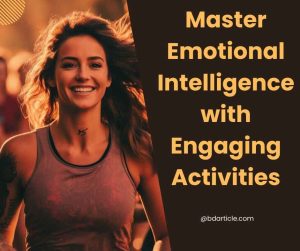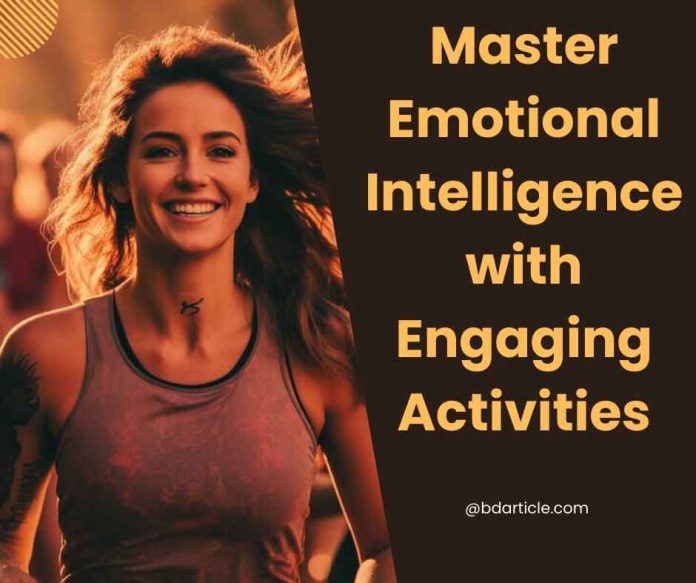Emotional intelligence activities for adults are crucial in today’s fast-paced, interconnected world. These activities not only help individuals manage their emotions but also improve interpersonal relationships, leading to personal and professional success. This comprehensive guide explores various emotional intelligence exercises that adults can integrate into their daily routines, offering a pathway to enhanced emotional and social well-being.

Understanding Emotional Intelligence
Emotional intelligence (EQ) refers to the ability to identify, understand, manage, and use emotions in positive ways to relieve stress, communicate effectively, empathize with others, overcome challenges, and defuse conflict. Adults with high EQ can navigate social complexities and make informed decisions.
Importance of Emotional Intelligence Activities for Adults
Developing emotional intelligence through structured activities can result in numerous benefits:
- Improved Communication Skills: Understanding and managing emotions can lead to clearer, more effective communication.
- Enhanced Relationships: Empathy and emotional regulation foster better relationships both personally and professionally.
- Better Mental Health: High EQ helps in managing stress, reducing anxiety, and preventing depression.
- Increased Self-Awareness: Regular practice of EQ activities heightens self-awareness, which is crucial for personal growth.
17 Emotional Intelligence Exercises
Let’s delve into some specific exercises designed to enhance emotional intelligence:
Mindfulness Meditation
Mindfulness meditation helps individuals stay present and manage their thoughts and emotions. By practising mindfulness, adults can learn to respond rather than react to emotional triggers.
Emotional Journaling
Keeping a journal to track daily emotional experiences can increase self-awareness. This activity encourages reflection on emotional responses and identification of patterns.
Active Listening Exercises
Practising active listening in conversations helps in understanding others’ emotions and improves empathy. This exercise involves fully concentrating, understanding, responding, and remembering what is being said.
Role-Playing Scenarios
Engaging in role-playing scenarios can improve emotional responses in various situations. This helps develop empathy and better understand others’ perspectives.
Empathy Circle
An empathy circle involves a group where participants share their feelings while others listen without judgment. This activity enhances emotional understanding and mutual respect.
Gratitude Journaling
Writing down things one is grateful for can shift focus from negative to positive emotions, fostering a more optimistic outlook.
Emotion Regulation Techniques
Learning techniques such as deep breathing, visualization, or progressive muscle relaxation can help in managing and regulating intense emotions.
Conflict Resolution Workshops
Participating in workshops that focus on resolving conflicts can improve emotional management and problem-solving skills.
Social Skills Training
Training in social skills like assertiveness, cooperation, and negotiation can enhance emotional intelligence and interpersonal effectiveness.
Self-Reflection Activities
Regular self-reflection activities, such as asking for feedback and assessing one’s emotional responses, can foster continuous EQ development.
Art Therapy
Engaging in art therapy allows adults to express and process emotions creatively, facilitating emotional healing and self-discovery.
Group Discussions on Emotional Topics
Participating in group discussions about emotional topics can provide diverse perspectives and enhance emotional understanding.
Cognitive Reappraisal Exercises
Cognitive reappraisal involves changing one’s perspective on a situation to alter its emotional impact. Practising this can improve emotional regulation.
Building Emotional Vocabulary
Expanding one’s emotional vocabulary by learning and using new words to describe feelings can improve emotional expression and understanding.
Mindfulness-Based Stress Reduction (MBSR)
MBSR combines mindfulness meditation and yoga to reduce stress and improve emotional regulation.
Self-Compassion Exercises
Practising self-compassion exercises, such as speaking kindly to oneself and recognizing common humanity, can enhance emotional resilience.
Developing Emotional Intelligence Online
Various online courses and activities can help adults develop emotional intelligence at their own pace, providing flexibility and convenience.
Free Emotional Intelligence Activities for Adults
Not all EQ activities require a financial investment. Here are some free activities that can be highly effective:
Guided Mindfulness Exercises
Many free resources offer guided mindfulness exercises that can be practised at home. These exercises help develop self-awareness and emotional regulation.
Online Journaling Platforms
Several online platforms offer free journaling tools that can aid in tracking and reflecting on emotions.
Volunteer Work
Volunteering can increase empathy and social skills, as it often involves interacting with diverse groups and understanding different perspectives.
Reading Self-Help Books
Many libraries and online platforms offer free access to self-help books focusing on emotional intelligence.
Emotional Intelligence Icebreakers for Adults
Icebreakers are activities that encourage people to interact and get to know each other in a relaxed setting. Here are some effective emotional intelligence icebreakers:
Two Truths and a Lie
This classic icebreaker involves participants sharing two truths, and one lies about themselves, encouraging others to guess the lie. It fosters self-disclosure and empathy.
Emotion Charades
Participants act out emotions without speaking, while others guess the emotion being portrayed. This activity enhances emotional recognition and expression.
Storytelling Sessions
Encouraging participants to share personal stories related to emotions can build empathy and emotional connections within a group.
Emotional Intelligence Bingo
Creating a bingo game with activities related to emotional intelligence, such as “I practised mindfulness today” or “I resolved a conflict peacefully,” can make learning about EQ fun and interactive.
Emotional Intelligence Activities for Students
Although the focus is on adults, it’s essential to recognize the importance of developing emotional intelligence in students as well. Activities tailored for younger individuals can lay the foundation for high EQ in adulthood.
Social-Emotional Learning Programs
Integrating social-emotional learning (SEL) programs in schools helps students develop self-awareness, self-regulation, and interpersonal skills.
Classroom Mindfulness Practices
Incorporating mindfulness practices into the classroom routine can help students manage stress and improve focus and emotional regulation.
Peer Mentoring Programs
Peer mentoring programs allow older students to guide younger ones, fostering empathy, leadership, and emotional growth.
Emotional Literacy Activities
Teaching students to recognize and label their emotions through activities such as emotion wheels or feeling charts can improve emotional understanding and communication.
Effective Time Management Tips for Online Learners
Time management is a crucial skill for online learners, impacting their emotional well-being and academic success. Here are some effective tips:
Set Clear Goals
Establishing clear, achievable goals helps in staying focused and motivated.
Create a Schedule
A well-structured schedule that allocates specific time slots for studying, breaks, and leisure ensures a balanced approach to learning.
Eliminate Distractions
Identifying and eliminating distractions, such as turning off notifications, can improve concentration and productivity.
Use Time Management Tools
Various apps and tools can help in tracking time and managing tasks effectively, reducing stress and improving performance.
Take Regular Breaks
Regular breaks are essential to avoid burnout and maintain mental and emotional well-being.
Seek Support
Reaching out for support from peers, instructors, or counsellors can provide guidance and reduce feelings of isolation.
Emotional Intelligence Activities for Adults Online
In the digital age, numerous online platforms offer activities to enhance emotional intelligence. Here are some recommended options:
Online EQ Assessments
Several websites provide free or paid EQ assessments that can help individuals understand their emotional strengths and areas for improvement.
Virtual Workshops and Webinars
Participating in virtual workshops and webinars on emotional intelligence topics can provide valuable insights and practical skills.
Interactive EQ Apps
Apps like Headspace, Calm, and Moodpath offer interactive exercises and tools to improve emotional awareness and regulation.
Online Support Groups
Joining online support groups can provide a sense of community and shared experiences, fostering emotional growth.
E-Learning Courses
Many e-learning platforms offer courses on emotional intelligence, allowing individuals to learn at their own pace and convenience.
Podcasts and Blogs
Listening to podcasts and reading blogs focused on emotional intelligence can provide continuous learning and inspiration.
Conclusion
Mastering emotional intelligence is a lifelong journey that significantly enhances personal and professional life. By incorporating emotional intelligence activities for adults into daily routines, individuals can develop a deeper understanding of their emotions and those of others, leading to more fulfilling and harmonious relationships. Whether through free resources, structured exercises, or online platforms, there are numerous ways to embark on this transformative journey. Remember, the key to emotional intelligence is consistent practice and an open mind to learning and growth.
Inbound and Outbound Link Suggestions:
External Links:
#EmotionalIntelligenceActivitiesForAdults #MindfulnessMeditation #EmotionalJournaling

